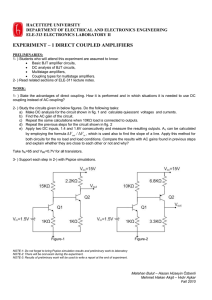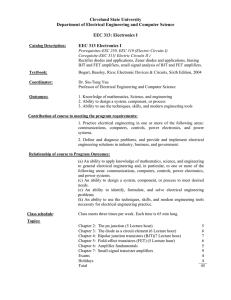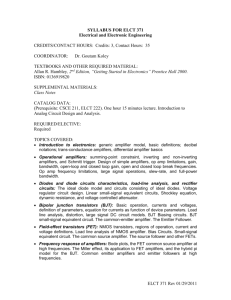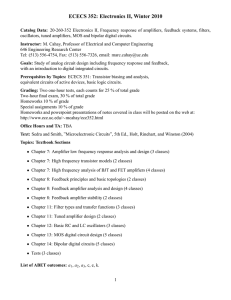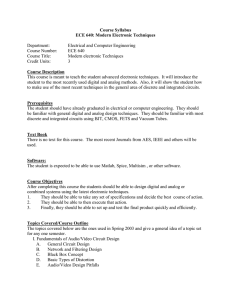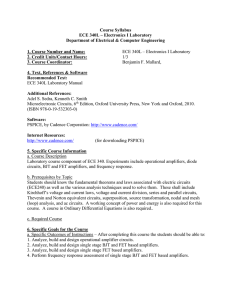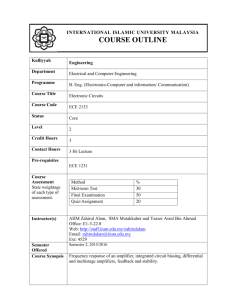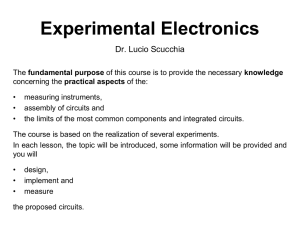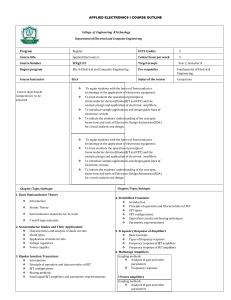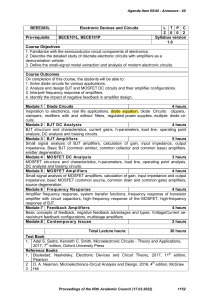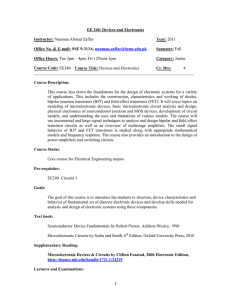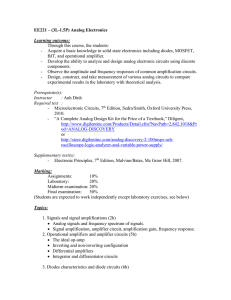Electronics (2) Course Syllabus - Jerash Private University
advertisement
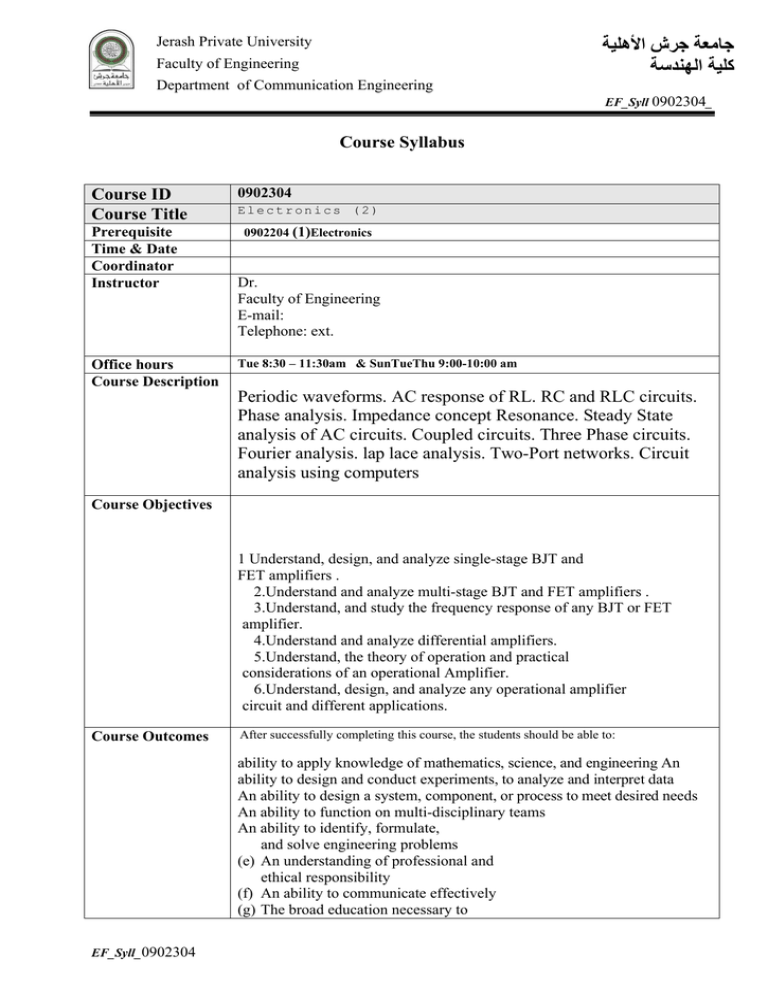
Jerash Private University ﺟﺎﻣﻌﺔ ﺟﺮش اﻷھﻠﯿﺔ ﻛﻠﯿﺔ اﻟﮭﻨﺪﺳﺔ Faculty of Engineering Department of Communication Engineering EF_Syll 0902304_ Course Syllabus Course ID Course Title Prerequisite Time & Date Coordinator Instructor Office hours Course Description 0902304 Electronics (2) 0902204 (1)Electronics Dr. Faculty of Engineering E-mail: Telephone: ext. Tue 8:30 – 11:30am & SunTueThu 9:00-10:00 am Periodic waveforms. AC response of RL. RC and RLC circuits. Phase analysis. Impedance concept Resonance. Steady State analysis of AC circuits. Coupled circuits. Three Phase circuits. Fourier analysis. lap lace analysis. Two-Port networks. Circuit analysis using computers Course Objectives 1 Understand, design, and analyze single-stage BJT and FET amplifiers . 2.Understand and analyze multi-stage BJT and FET amplifiers . 3.Understand, and study the frequency response of any BJT or FET amplifier. 4.Understand and analyze differential amplifiers. 5.Understand, the theory of operation and practical considerations of an operational Amplifier. 6.Understand, design, and analyze any operational amplifier circuit and different applications. Course Outcomes After successfully completing this course, the students should be able to: ability to apply knowledge of mathematics, science, and engineering An ability to design and conduct experiments, to analyze and interpret data An ability to design a system, component, or process to meet desired needs An ability to function on multi-disciplinary teams An ability to identify, formulate, and solve engineering problems (e) An understanding of professional and ethical responsibility (f) An ability to communicate effectively (g) The broad education necessary to EF_Syll_0902304 understand the impact of engineering solutions in a global and societal context. (h) A recognition of the need for, and an ability to engage in life-long learning (i) A knowledge of contemporary issues (j) An ability to use the techniques, skills, and modern engineering toolsnecessary for engineering practice Course Topics 1. Small-Signal Low-Frequency Analysis and Design: 10 Hours 2. Multi-Stage Amplifiers 7 Hours 3. 8 Hours Frequency Response 4. Differential Amplifiers 5. Operational Amplifiers Theory 6. 8 Hours 2 Hours Operational Amplifiers : 8 Hours applications Course Text Book Microelectronic circuit analysis and design by D. Neamen Course References 1. Electronic Circuits by D. Schilling and Belove 2. Electronic Devices and Circuits by Bogart Microelectronic circuits by Sedra and Smith Course delivery Lectures Tutorial Lab Homework Project Computer Internet Industrial Visit Course Assessment Assignments & short reports.………………….. 10% 2 exams @ 20% each …………………………. 40% Final exam …………………………………….. 50% Dr. Takialddin AL-Smadi 10/2009 Updated PO1 CO1 CO2 CO3 CO4 CO5 CO6 CO7 CO8 EF_Syll-0902304 PO2 PO3 PO4 PO5 PO6 PO7 PO8 PO9 PO10 PO12 CO9 a b C D e f g h i j K CO1 CO2 CO3 CO4 CO5 CO6 CO7 CO8 CO9 ABET a-k Engineering and Technology program outcome (a) (b) (c) (d) (e) (f) (g) (h) An ability to apply knowledge of mathematics, science, and engineering An ability to design and conduct experiments, to analyze and interpret data An ability to design a system, component, or process to meet desired needs An ability to function on multi-disciplinary teams An ability to identify, formulate, and solve engineering problems An understanding of professional and ethical responsibility An ability to communicate effectively The broad education necessary to understand the impact of engineering solutions in a global and societal context (i) A recognition of the need for, and an ability to engage in life-long learning (j) A knowledge of contemporary issues (k) An ability to use the techniques, skills, and modern engineering tools necessary for engineering practice Plagiarism Deliberate plagiarism is a serious act of academic misconduct. Students may be suspended from the University if they are found to have plagiarized their course work. Whether inadvertent or deliberate, plagiarism includes the following: (a) word-for-word copying of sentences or whole paragraphs or presenting of substantial extracts from either paper-based or electronic sources the work or data of others that are published or unpublished (such as books, internal reports, and lecture notes or tapes) without clearly indicating their origin; (b) using very close paraphrasing of sentences or whole paragraphs without due acknowledgement in the form of reference to the original work; (c) submitting another student’s work in whole or in part; (d) using of another person’s ideas, work or research data without acknowledgement; (e) copying computer files, algorithms or computer code without clearly indicating their origin; (f) submitting work that has been written by someone else on the student’s behalf; and (g) submitting work that has been derived, in whole or in part, from another student’s work by a process of mechanical transformation (e.g., changing variable names in computer programs). EF_Syll-0902304
